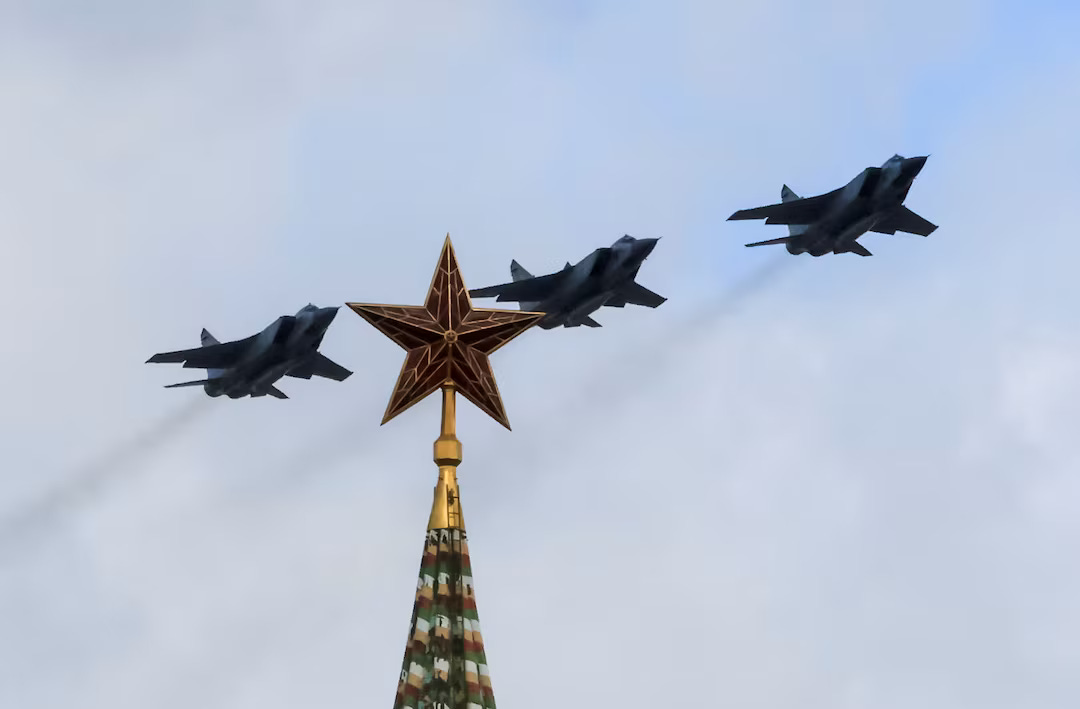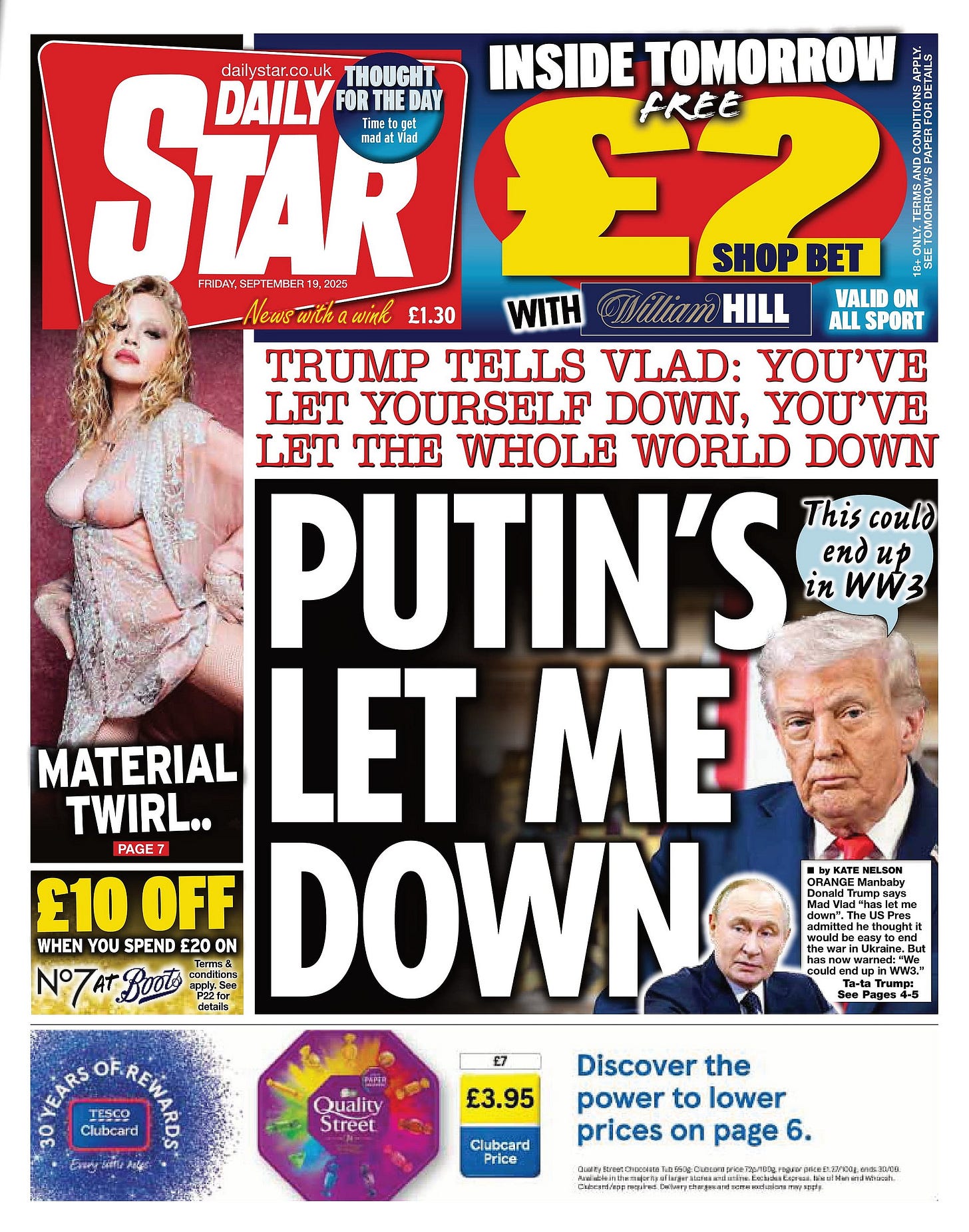Kremlin’s Border Games Show NATO Still on the Back Foot
Russian MiG-31s violated Estonian airspace, drones swarmed Poland & Romania, & Lavrov dismissed Trump’s land swap - while EU trumpets a 19th sanctions package. The message from Moscow: escalation pays
Three Russian fighter jets flew into Estonian airspace on Friday in what would appear to be the third attempt by the Kremlin this month to test NATO’s eastern border. The MiG-31 aircraft — heavy interceptors capable of carrying Russia’s Kinzhal hypersonic missile — entered via the Gulf of Finland. The jets circled for about 12 minutes and NATO scrambled Italian F-35s to repel them. The incursion comes after Russia last week also sent drones into Poland and Romania, two other frontline NATO members. "The Russians have been flying this exact airspace for decades. It's difficult to see how this wasn't intentional," a U.S. official told POLITICO. NATO spokesperson Allison Hart said “this is yet another example of reckless Russian behaviour and NATO’s ability to respond.” EU foreign policy chief and former Estonian Prime Minister Kaja Kallas described the incursion as "an extremely dangerous provocation.” Estonia said it had summoned Russia’s chargé d’affaires in Tallinn. “Russia has violated Estonian airspace four times already this year, which is unacceptable in itself, but today’s violation, during which three fighter jets entered our airspace, is unprecedentedly brutal,” Foreign Minister Margus Tsahkna said. “Russia’s ever-increasing testing of borders and aggression must be responded to by rapidly strengthening political and economic pressure.” Earlier this month, Poland reported more than a dozen drones crossed its border overnight, with some heading toward the strategic hub of Rzeszów. Polish forces, backed by NATO allies, shot down several drones and later invoked NATO's Article 4, which calls for the alliance to hold consultations. Warsaw called the incident a deliberate Russian provocation - Politico
Russian Foreign Minister Sergey Lavrov has stated that territorial exchanges will not “stop” Russia’s war in Ukraine, in contradiction to US President Donald Trump’s recent statements that peace between Russia and Ukraine will require “land swaps.” Lavrov also asserted that attempts to “entice” Putin with the restoration of US-Russian trade will also not end Russia’s war. Lavrov claimed that Russia would view any European forces deployed to postwar Ukraine as “legitimate military targets.” Lavrov’s statements follow similar statements from other high-ranking Kremlin officials in recent weeks, rejecting post-war Western security guarantees for Ukraine - ISW
The European Union announced a fresh package of sanctions on Friday meant to hit Russia’s economy and make it more difficult for the country to fund its war in Ukraine, with plans to curb its energy trade and punish financial service companies. With the new package — the bloc’s 19th — Europe’s leaders are trying to ramp up pressure on President Vladimir V. Putin of Russia. But they are also sending a signal to the White House after President Trump has in recent days called on European nations to stop buying oil from Russia. “It is time to turn off the tap,” bloc chief Ursula von der Leyen said. “Our sanctions are an effective tool of economic pressure, and we will keep using them until Russia comes to the negotiating table.” The package includes a plan to phase out Russian liquefied natural gas purchases by the start of 2027, a year earlier than previously planned. It also includes provisions meant to pressure companies from China and other nations to stop doing business with Russia. For the first time, it will hit cryptocurrency platforms that enable transactions with Russia. The sanctions would also add more ships to the European Union’s blacklist. With those additions, the bloc would have sanctions on 560 vessels that are part of Russia’s so-called shadow fleet, a force of often-dilapidated ships with murky ownership structures that have helped the nation to get around Western limits and continue to profit from oil sales. The latest package of sanctions will need to gain approval from political leaders across the 27-nation bloc, which could happen as soon as next month. Because the sanctions were negotiated extensively before their announcement, some version of the proposal is likely to eventually be adopted - NYT
My Hot Take Analysis:
Russia’s latest provocation - three MiG-31 fighter jets brazenly violating Estonian airspace - isn’t an accident. It’s the Kremlin’s third attempt this month to probe NATO’s eastern flank, following recent drone incursions into Poland and Romania. Orders for such a high-stakes maneuver almost certainly came from the very top—perhaps even Russian President Vladimir Putin himself.
Yes, NATO scrambled Italian F-35s to repel the incursion, but “scrambling” is hardly a strategy. The Baltic states—tiny in size and, in Estonia’s case, without a real air force of their own - are heavily reliant on NATO’s umbrella. This episode lays bare how fragile that protection looks when repeatedly tested.
Meanwhile, Brussels just rolled out its 19th sanctions package since Russia’s full-scale invasion - this time targeting LNG, a long-awaited move. But officials told Politico that the most effective measures would come only if Washington also adopted hard-hitting economic restrictions and stronger enforcement.
But here’s the bitter truth: if the EU had mustered the will to launch 19 packages from day one, Ukraine and Europe might not be facing this perilous moment.
Bottom line: Putin is testing NATO’s resolve and President Trump’s willingness to backstop Europe. NATO can’t afford to keep treating these incursions as routine - because to Moscow, every unpunished violation is a green light to push further.
America’s late-night talk show hosts rallied Thursday to support Jimmy Kimmel after his suspension — and accused President Donald Trump of sliding into authoritarianism. TV network ABC yanked Kimmel off air after comments about the killing of conservative activist Charlie Kirk that appeared to associate his alleged assassin with the MAGA movement triggered a backlash from Trump allies. Stephen Colbert — whose own program on CBS was canceled after he criticized the network’s decision to pay Trump millions to settle a lawsuit — used his opening monologue to slam the Trump administration and ABC for “blatant censorship.” “With an autocrat, you cannot give an inch,” Colbert said. “If ABC thinks that this is going to satisfy the regime, they are woefully naive.” Colbert was joined by Jon Stewart, host of Comedy Central’s “The Daily Show,” who mockingly played the role of a grovelling propagandist in a dictatorship. In front of a fake gold backdrop, a jab at Trump’s redesign of the White House, Stewart informed viewers the episode would be “another fun, hilarious, administration-compliant show.” Over at “The Tonight Show” on NBC, Jimmy Fallon called Kimmel “a decent, funny and loving guy” and called for his reinstatement. Fallon reassured viewers he would not be “censored” and launched into a commentary about Trump’s visit this week to the U.K. — before he was quickly drowned out by a satirical voiceover saying the president was “incredibly handsome” and “restoring our national reputation.” Disney-owned ABC announced Wednesday it was indefinitely pausing Kimmel’s late-night talk show, “Jimmy Kimmel Live!,” caving to pressure from Brendan Carr, the Trump-appointed chair of the Federal Communications Commission. Carr had urged ABC and local broadcasters earlier that day “to take action” against Kimmel, calling the comedian’s comments “truly sick” and warning, “We can do this the easy way or the hard way.” - Politico
A federal judge in Florida threw out President Trump’s lawsuit against the New York Times on Friday, saying the complaint his attorneys filed earlier this week against the newspaper is too long and needs to be truncated to be considered.
“A complaint is not a megaphone for public relations or a podium for a passionate oration at a political rally or the functional equivalent of the Hyde Park Speakers’ Corner,” Judge Steven Merryday, an appointee of former President George H. W. Bush, wrote in the order, saying his court was not a venue for Trump to “rage against an adversary.” The judge gave Trump’s attorneys 28 days to file an amended complaint. The president sued the Times and several of its reporters for defamation Monday, alleging the news outlet and its journalists acted with reckless disregard for the truth as it covered him in the lead-up to the 2024 election. The Times company in a statement when Trump’s lawsuit was filed called his complaint “without merit,” and Times executive editor Joseph Kahn expressed confidence Thursday the outlet would prevail in the case - The Hill
President Donald Trump has been flayed by the American people in a brutal poll portraying widespread frustration with his handling of key issues. The Washington Post-Ipsos questionnaire asked citizens their opinions on six major topics of the day, yielding overall disapproval by double-digit margins in all of them. At the bottom of the pile, with just 34 percent approval, were his far-reaching tariffs, which have stung consumers with increased prices on imported goods. With 64 percent disapproving, it was only four points worse than his handling of the Russia-Ukraine war. Just 38 percent approve, after he promised to end the conflict within a day of his inauguration. Some 40 percent of the 2,513 surveyed backed his management of the economy, 19 points down amid disapproval on inflation and relentless pressure by the administration on the Federal Reserve to cut rates. The White House’s strongest approval ratings came on immigration and crime, with a 44 percent approval rating in two areas Trump has claimed to prioritize - Daily Beast
Israel’s targeted strikes on two newspaper offices in Yemen’s capital, Sanaa, which killed 31 journalists and media support workers on September 10, signal that its deadly pattern of attacking reporters and newsrooms on the grounds that they publish “terrorist” propaganda has spread firmly across the Middle East, says the Committee to Protect Journalists (CPJ). Yemen’s September 26 newspaper was the first to name the 31 killed by multiple strikes on its office and that of the Yemen newspaper, both in the government’s Moral Guidance Directorate’s headquarters. All but one of the dead worked for the two outlets. Nasser Al-Khadri, editor-in-chief of 26 September, described the killings as an “unprecedented massacre of journalists,” with multiple strikes hitting its newsroom at around 4:45 p.m. as staff were finalizing publication of the weekly paper, which is the Yemeni army’s official outlet. “It is a brutal and unjustified attack that targeted innocent people whose only crime was working in the media field, armed with nothing but their pens and words,” he told CPJ, adding that many colleagues were reduced to body parts. A child, who had accompanied a journalist to work, was among the dead, Al-Khadri said, while 22 journalists were injured. Israel’s attack on Yemen, the CPJ said, echoes previous strikes on Gaza, Lebanon, and Iran, where it has repeatedly failed to distinguish between military targets and journalists, justifying its assassinations by smearing journalists as terrorists or propagandists, without credible evidence. As civilians, journalists are protected under international law, including those working for state-run or armed group-affiliated outlets, unless they take direct part in hostilities.
“Since October 7, 2023, Israel has emerged as a regional killer of journalists, with repeated incidents in Gaza, Lebanon, Iran, and now Yemen confirming Israel’s longstanding pattern of labeling journalists as terrorists or propagandists to justify their killings…This latest killing spree is not only a grave violation of international law, but also a terrifying warning to journalists across the region: no place is safe” - CPJ Regional Program Director Sara Qudah






